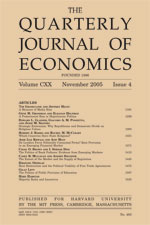 | |
| Discipline | Economics |
|---|---|
| Language | English |
| Edited by | Robert J. Barro, Lawrence F. Katz, Nathan Nunn, Andrei Shleifer, Stefanie Stantcheva |
| Publication details | |
| History | 1886–present |
| Publisher | Oxford University Press for Harvard University Department of Economics |
| Frequency | Quarterly |
| 5.920 (2011) | |
| Standard abbreviations | |
| ISO 4 | Q. J. Econ. |
| Indexing | |
| ISSN | 0033-5533 (print) 1531-4650 (web) |
| JSTOR | 00335533 |
| OCLC no. | 1763227 |
| Links | |
The Quarterly Journal of Economics is a peer-reviewed academic journal published by the Oxford University Press for the Harvard University Department of Economics. Its current editors-in-chief are Robert J. Barro, Lawrence F. Katz, Nathan Nunn, Andrei Shleifer, and Stefanie Stantcheva.